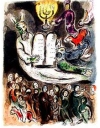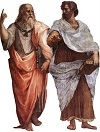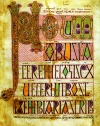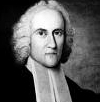|
MANY OF TODAY'S CHURCH LEADERS seem to hold views about ethnic Israel that express institutionalized prejudice and an "anti-Jewish" bias. But how did the church get so far removed from the Jewish roots of the faith? Is Christianity essentially anti-Semitic in its perspective? Is it possible to be a sincere Christian and yet be anti-Jewish?
In a sermon I heard recently, a well-known American Evangelical teacher announced to his congregation that he would prefer to have the church "fix his car" rather than get a "free trip" to Israel for his 30th anniversary. He further stated that he's never been to Israel and has no desire to ever go there, expressing an almost callous indifference to Israel's past, present, or future. Indeed, this teacher said that if Israel were destroyed by a war in the Middle East, it would have no bearing on his faith in the Lord...
Now this might strike you as rather insignificant, hardly worth mentioning at all, but there are certain theological assumptions lurking behind this sentiment that should be alarming for Christians who hold faith in the veracity of the Jewish Scriptures. What would cause a pastor of a large, Bible-believing church to apparently disdain the idea of going to see the land of Jesus -- and to suggest that ethnic Israel is essentially irrelevant? How could someone who regularly studies and preaches from the Jewish Scriptures believe that Israel - past, present, and future - is functionally meaningless for those of the Christian faith?
To understand some of this mystery, we have to back up and think about theological presuppositions. In particular, we have to revisit the basic assumptions theologians make when they read the Jewish Scriptures. Many Christian theologians assume a "New Testament priority" when reading the "Old Testament." Simply put, this means that they apply the terms of the Greek New Testament as they "read backwards" to the Old. As I have said elsewhere, however, while it's possible that the Old Testament is true and the New Testament is not, it's impossible for the New Testament to be true if the Old Testament is not. In other words, we must first take pains to understand the meaning of the Hebrew Scriptures -- and especially the Hebraic mindset -- before we draw our conclusions about the meaning of the New Testament. It is just common sense to read things in context, after all. "To the Hebrew first, and then to the Greek" (Rom. 1:16; 3:1-2).

"To the law and to the testimony: if they speak not according to this word, it is because there is no light in them." - The Prophet Isaiah
Theologians all bring assumptions and biases when they read the Scriptures, but ideally the goal should be to discover the author's original intent as it was communicated to his audience. In other words, they should always try to read in context, taking into account the historical situation of the author (including the historical usage of the words and grammar) as well as the culture of those who would read his words. Violating this basic principle invites "reading into the text" things that just aren't there. That means, among other things, that if you are a Gentile theologian steeped in Western Greek traditions, you better be careful to remember that you are reading Jewish literature. Both the "Old Testament" as well as the "New Testament" are writings from Jews predominantly to fellow Jews. Failure to realize this rather obvious fact leads to bizarre and misguided interpretations of the Scriptures.
Of course, within the Jewish literature of the Bible there are different genres (types) of writing. There are historical narratives (prose), legal codes, genealogies, annals, poetry, prophecies, prayers, laments, proverbs, miracle stories, parables, didactic letters (epistles), apocalyptic visions, and so on. In addition to the overarching fact that we are dealing with Jewish literature, then, the Bible interpreter must understand the type of literature he or she is reading. We do not read the Bible's poetry as prose, after all, and conversely, we shouldn't attempt to find allegories and symbols in historical accounts. The use of logic is essential to ascertaining the meaning of a text.

The study of interpretation theory is sometimes called "hermeneutics." In Talmudic Judaism, for instance, various compilations of rules and methods for determining the meaning of Scripture were devised. In addition to studying the diction and grammar of a given text, Jewish tradition adds the techniques of logical deduction and rules of inference, the critical study of the Masorah (i.e., the scribal transmission process as well as the stylization of the text), the use of "gematria" (Bible codes), but most importantly, the use of precedence in interpretation (i.e., the communal dialog of the Oral Law). This general approach, it should be noted, was vastly different than the Hellenistic theology of Philo and the Jews of Alexandria in the second century B.C. who attempted to synthesize Greek philosophy (i.e., Plato) with traditional Judaism by means of allegorical interpretation methods.

Christianity initially was embedded within the cultural matrix of Second Temple Judaism, of course, but it quickly became enmeshed in Hellenistic (Greek) culture and pagan tradition. The first "apostolic fathers" and apologists of Christianity quoted Scripture in order to refute various heresies (i.e., Gnosticism, Docetism, Montanism, etc.) and to demonstrate that Jesus was indeed the Messiah. Most of these early church leaders were Hellenistic Gentiles (e.g., Justin Martyr, Irenaeus, Clement of Rome, Tertullian, Origen, etc.) who sought to synthesize their Greek thinking with the Jewish Scriptures. Like Philo before them, these early "Alexandrian" apologists adopted the allegorical method of interpreting the Scriptures. For example, according to these "apologists," God destroyed the Temple and Jerusalem as a sign that He had abandoned the Jewish people. Now Gentile Christians were the chosen people who would "reconstitute" the Temple apart from Jerusalem's influence. This is the core idea of what would later be called "Replacement Theology."
After the "conversion" of the pagan Emperor Constantine in the 4th century, the Church became the official religion of the Roman Empire, and Greek/Roman thought eclipsed the Hebraic mindset of the original Jesus movement in Palestine. Constantine decreed that "Sun Day" would now be the weekly day of rest, further removing the Romanized church from its Jewish matrix and heritage. Later Greek and Latin "fathers" (such as Jerome, Chrysostom and Augustine) continued to resort to the Greek philosopher Plato and used the allegorical method in their theological writings. Augustine, in particular, explained the existence of the Jew as the mark of humiliation and vindication of the Church as the "new Israel" (see his Sermon Against the Jews). Augustine's ecclesiology was more fully developed in his famous book called The City of God in which he conceives of the church as a heavenly city or kingdom, ruled by love, which will ultimately triumph over all other earthly empires and peoples (including, of course, the Jewish people). With the acceptance of The City of God by the church and Augustine's later canonization, Replacement Theology was entirely entrenched within Church tradition...

During the medieval Scholastic period, the Greek pagan philosopher Aristotle was rediscovered and made popular, and various Christian theologians (most notably Thomas Aquinas) sought again to synthesize Greek thinking with the truths of Scripture (this was mirrored, incidentally, by Maimonides in the Jewish world). The use of deduction, logic, and arid theoretical refutations (i.e. the "Scholastic Method") became vogue... The Church's Replacement Theology continued, of course, as "Christian Europe" made the Jewish people into functional pariahs, providing them with limited career opportunities (in money-lending, considered an unclean business) and generally making their lives miserable. The various "Crusades" and "Inquisitions" were further expressions of the arrogance of the "Holy Roman Empire" -- and the romanized Christian Church.

During the period of the Reformation and the rise of Protestantism, the Latin Vulgate (i.e., the translation of the Scriptures by the Catholic scholar Jerome) was rejected and a renewed emphasis on the Greek and Hebrew texts of Scripture arose. The Scholastic method based on Aristotelian logic was dropped in preference of newer ideas of scientific induction, empirical observation, and so on. Erasmus and Luther began to translate (and reread) the original Scriptures using inductive methods of study, and this, of course, led to the so-called "Reformation" of the Church. As a Hebrew scholar, at first Luther attempted to befriend the Jewish people (perhaps to learn Hebrew), but later in life he turned vicious in his attacks upon them. Following the footsteps of Augustine and other early "church fathers," Luther taught that by rejecting Jesus the Jews became the "quintessential other," a model of the opposition to the Christian view of God. Like many before him, he argued that the Jews were no longer the chosen people, but were rather "the devil's people," "stupid fools," and "proud blasphemers" who should be forcibly ejected from society (later Adolf Hitler justified the Holocaust of the Jewish people as the logical consummation of Luther's ideas).

With the influence of the "Age of Enlightenment," Immanuel Kant's "transcendental idealism" became the prevailing creed in academia. Kant tried to resolve the dilemma created by Renaissance thinking (i.e., inductive methodologies) with the traditional "rationalism" of earlier thinkers (i.e., deductive methodologies). His synthesis, which he boldly called a "Copernican Revolution," placed the active, rational human subject at the center of the cognitive world. Human knowledge, in other words, isn't a passive affair, but instead relies on categories of understanding that are brought to the perceptual process. What we can directly know is only phenomena (empiricism) as it is mediated by the mind's rules of apprehending sensation (rationalism); however we can never directly know the noumenal realm (i.e., what lies behind the sensations of the mind itself) or the "thing-in-itself." The mind was therefore restricted to phenomenal realm. Eventually this dualism between appearance and reality was applied to the understanding of Biblical texts.

The academic work of the German theologian Friedrich Schleiermacher (1768-1834), for example, attempted to reconcile scientific rationalism with traditional Protestant theology. Schleiermacher's "rationalistic hermeneutic" explained away the miraculous from Scripture as being either myth or superstition (in the Jewish world, Baruch Spinoza was perhaps the progenitor of this method). This approach later transformed itself into the "higher critical" school of Biblical interpretation with various documentary hypotheses (JEDP) that questioned the authorship and integrity of the Scriptures. Various conservative reactions within Protestantism tried to preserve the realm of faith, such as Karl Barth and Rudolf Bultmann's distinction between the "Jesus of history" and the "Christ of faith." A "neo-Orthodox hermeneutic" arose that claimed that the Bible in itself is not God's revelation but only becomes such when someone accepts it through faith. Interpretation was thus seen primarily as a personal encounter with God.
Despite the mysticism of neo-Orthodoxy, rationalistic theology continued to gain ground and generally became the predominant theology of "Christian Europe." Today we see its fruit in the "Jesus Seminar" that promotes various scholarly speculations about what the historical Jesus might have really said as opposed to what the Gospel records attribute to Him (as well as other fanciful reconstructions of the "historical Jesus" you might see on television these days). Rationalistic theology is also taught in many mainline Protestant Seminaries in America. The spiritual realm is consigned to the realm of the "noumenal," and that means that it is essentially irrational and unknowable...
The American Fundamentalist movement initially arose as a reaction to these liberal and rationalistic approaches. Originally a movement of Princeton Seminary through the work of John Gresham Machen (1881-1937), Fundamentalism 1) asserted the full authority and divine inspiration of the Scriptures (i.e., the rejection of rationalistic reconstructions of the Bible), 2) the authenticity of miracles, and 3) disputed the idea that Christian spirituality must be consigned to the murky realm of the "noumenal." As this viewpoint gained popularity, more and more people began to actually read the Scriptures for themselves. Using common sense, the idea of allegorizing the Scriptures and extrapolating meaning based on the "spirit of the age" was questioned. Consistently reading the Scriptures according to the "grammatical-historical" method eventually led to the expression of classical "Dispensationalism" and the distinction between the Jewish people (understood as ethnic Israel) and the Church. This hermeneutical approach was more or less institutionalized by C. I. Scofield (1843-1921) and was later codified by Lewis Sperry Chafer (1871-1952), the first president of Dallas Theological Seminary.
After World War II, America culture "caught up with" the rest of Europe and entered into the postmodern period of despair. The philosophy of Kant had led to the irrationalism of Hegel and Nietzsche -- which ultimately led to the crashed ruins of German nationalism. As the threat of modern rationalism apparently abated, the reactionary force of the "Fundamentalist movement" began to wane. Over time subtle compromises with the grammatical-historical method of interpretation rekindled the liberal thinking of older Protestant theology. The subsequent "Evangelical movement" created a buffet-style of theologian expression among its church leaders and teachers, ranging from charismatic irrationalism to the adoption of liturgical worship and even sacredotalism. This confusion led to the development of the "Emergent Church" movement that claimed that any form of traditional Christianity had become obsolete. A postmodern "ideological hermeneutic" arose that insisted that the Scriptures are "read" merely to justify a particular agenda or narrative (i.e., there is no "right interpretation" any longer). This classically postmodern approach is "reader-centric" because it claims that the original meaning of the authors of Scripture is essentially unknowable.

Not all Evangelical teachers and preachers have made the "postmodern turn" in their thinking, of course. Some have reacted to the nihilism of the Emergent Church by seeking to return Christianity to its (supposed) original roots and meaning. For instance, Dr. John Piper considers the Puritan era to be a sort of "Golden Age" of Christian expression and therefore draws much inspiration from the writings of the Puritan Covenant theologian Jonathan Edwards (1703-1758). Other theologians have their traditional heroes (and villains) as well. But common to most of these newer traditions is a reversion to the allegorical method of interpretation based on ancient Greek speculation. And that approach invariably returns the Church to the old errors of Replacement Theology....

In other words, the contemporary Evangelical world can be divided between two primary interpretive approaches to the Scriptures: the "allegorical approach" or the "historical-grammatical" approach. Another way to say this is that Evangelicals can be classified under either the general rubric of "Covenant Theology" or "Dispensationalism" (there are variations of both these views, such as "New Covenant Theology" or "Progressive Dispensationalism," but the basic division centers on questions related to the use of analogy in our interpretations). In general, advocates of the allegorical method of interpreting Scripture are "Covenant theologians" (and therefore are part of the early church's tradition of regarding "Israel" as a parable, or allegory, for the Christian Church), whereas advocates of the grammatical-historical method are often "Dispensationalists" (and therefore make a clear separation between "Israel" and the "Church"). Note that a common euphemism for Replacement Theology is "Completion Theology," suggesting that the Church is the "completion" (i.e., "end") of God's original (i.e., "allegorical") plan for Israel...
An "allegorical hermeneutic" downplays the literal meaning of the text as only one of many layers of possible meanings. The goal of interpretation is therefore to discover the (hidden, allegorical, etc.) meaning of a given writer as it is understood in light of the overall "unity of the Bible." This will result in a coherent philosophical theology that provides answers to questions regarding the meaning and purpose of life, the goal of history, and so on. This is a valid way of reading the Scriptures, similar to traditional Jewish theology's use of Midrash (stories, parables, etc.) and Gematria, though it should be understood that such use of allegory is derivative of the authority of the plain sense (p'shat) of the texts themselves...
In contrast to this approach, the "grammatical-historical hermeneutic" seeks to discover the original intent of the author of a text by studying the grammar/syntax in the author's historical and cultural context. The goal of interpretation is therefore to discover the (singular) meaning of the writer as he intended that meaning to be communicated to his original audience. This will result in an accurate understanding of the texts of Scripture (exegesis) that allows the unique voice of each original author to be heard -- without imposing a preconceived theological system to "filter" the results.
Since Covenant theology attempts to answer the "big questions" about the meaning and purpose of life, the goal of history, and so on, many Covenant theologians allegorize ancient Israel by claiming it to be synonymous with the "church," and therefore the promises God made to Israel really were made to church). Instead of regarding the Christian church as something new -- a "mysterious" body of people who become "grafted in" to the faithful remnant of Israel (Rom. 11:25, Eph. 3:9, Col. 1:26-27, etc.) -- Covenant theologians read backwards, and claim that "Israel" was grafted into the church, or more precisely, denies that there was a "grafting" at all....
And this explains, in large measure, the disdain shown for the existence of the nation of Israel today among many Christian theologians today. Instead of marveling over the miracle of God's providential care for the lineage of Jacob by causing the Jews to return to their ancient homeland after thousands of years of exile among the nations -- an event that was clearly prophesied by Moses (Deut. 28:64, 30:3) -- they often express a studious indifference. And this belittling attitude makes perfect sense if you allegorize the promises of God given to ethnic Israel as really being about the Christian church. Once you define the Church as Israel (or "reconstituted Israel" or "completed Israel"), you thereby imply that ethnic Israel was some sort of failed social experiment by God -- at best an object lesson for those who are the true people of God.
Using this interpretative scheme, ethnic Israel is (simplistically) regarded as a pathetic footnote about the failure of man to keep the terms of the covenant, and the Jewish people are therefore regarded as living parable (or analogy) for those who reject God's saving actions through Jesus... The Jews are destined to "wander the earth," homeless and forsaken, until they repent and accept Jesus as his Savior. Persecution of the Jewish people is thereby tacitly endorsed, since the Jews "get what's coming to them" because they have rejected God's greatest historical covenant of all -- the giving of His Son for the redemption of the world.

Notice how this line of thinking quickly goes beyond the Church's claim that the covenants and blessings originally given to Israel belong to the church to insinuations that modern day Israel is illegitimate. After all, if the Christian church is the true "Israel of God" (i.e., "reconstituted Israel"), then the existence of the modern State of Israel -- and therefore the Jewish people themselves -- is an affront and embarrassment to such theology itself. Despite their heritage, history, and the plainly stated promises of God in the Scriptures, the Jewish people are libeled as the "synagogue of satan," impostors, disobedient children, destined to wander in hardship and exile (for more, see Martin Luther's "On the Jews and their Lies").
The grammatical-historical approach to reading Scripture makes room for the original authors to speak for themselves. Consistently reading the Scriptures using this method will lead to the conclusion that God's plan and purpose for ethnic Israel is a matter of great importance to the LORD God of Israel (ūÖų░ūöūĢųĖūö ūÉų▒ū£ūöųĄūÖ ūÖų┤ū®ūéų░ū©ųĖūÉųĄū£), who described his people as "the apple of His eye." Indeed, "the one born the King of the Jews" lamented over Jerusalem and the "lost sheep of the house of Israel" and promised to return one day to physically reign over the "City of the great King" (i.e., Jerusalem). Indeed, Jesus' entire mission was to ransom captive Israel in fulfillment of the promises of the Hebrew prophets. According to the plain sense of Scripture, ethnic Israel's glorious future assuredly awaits them:
When you are in tribulation, and all these things come upon you in the latter days (ūÉųĘūŚų▓ū©ų┤ūÖū¬ ūöųĘūÖų╝ųĖū×ų┤ūÖūØ), you will return to the LORD your God and obey his voice (Deut. 4:30).
The LORD will scatter you among all peoples, from one end of the earth to the other, and there you shall serve other gods of wood and stone, which neither you nor your fathers have known ... then the LORD your God will restore your fortunes and have compassion on you, and he will gather you again from all the peoples where the LORD your God has scattered you. (Deut. 28:64, 30:3).
He said, "Son of man, these bones are the whole house of Israel. They say, 'Our bones are dried up and our hope is gone; we are cut off.' Therefore prophesy and say to them: 'This is what the Sovereign Lord says: O My people, I am going to open your graves and bring you up from them; I will bring you back to the land of Israel. Then you, My people, will know that I am the Lord, when I open your graves and bring you up from them. I will put My Spirit in you and you will live, and I will settle you in your own land. Then you will know that I the Lord have spoken, and I have done it,' declares the Lord" (Ezek. 37:11-14).
Fear not, for I am with you. I will bring your seed from the east, and gather you from the west. I will say to the north, Give up; and to the south, Keep not back; bring My sons from far, and My daughters from the ends of the earth..." (Isa. 43:5-6).
Such words of the Hebrew prophets make no sense if we allegorize Israel to "really mean" the Church (or conversely, if we claim that the church really is "reconstituted Israel"). This sort of exegetical error might have been excusable in the Middle Ages or even during the Reformation when there was no State of Israel in existence, but since 1948 we've seen the Jewish people returning to the ancient Promised Land from all over the world. Am Yisrael Chai - "the people of Israel live!" How certain Christian teachers can ignore such a "mega sign" from heaven in light of the explicit promises that God will NEVER abandon his original covenant people is therefore entirely inexplicable.

As a further reminder, the only reference to the New Covenant in the entire Tanakh (Old Testament) is found in Jeremiah 31:31-37, where it is explicitly stated that the Jewish people will continue to exist as a nation as long as there is a sun and moon seen in the sky! The perpetuity of Israel is therefore guaranteed by Divine Promise:
Behold, the days are coming, declares the LORD, when I will make a new covenant with the house of Israel and the house of Judah, not like the covenant that I made with their fathers on the day when I took them by the hand to bring them out of the land of Egypt, my covenant that they broke, though I was their husband, declares the LORD. But this is the covenant that I will make with the house of Israel after those days, declares the LORD: I will put my law within them, and I will write it on their hearts. And I will be their God, and they shall be my people. And no longer shall each one teach his neighbor and each his brother, saying, 'Know the LORD,' for they shall all know me, from the least of them to the greatest, declares the LORD. For I will forgive their iniquity, and I will remember their sin no more."
Thus says the LORD, who gives the sun for light by day and the fixed order of the moon and the stars for light by night, who stirs up the sea so that its waves roar - the LORD of hosts is his name: If this fixed order departs from before me, declares the LORD, then shall the offspring of Israel cease from being a nation before me forever." Thus says the LORD: "If the heavens above can be measured, and the foundations of the earth below can be explored, then I will cast off all the offspring of Israel for all that they have done, declares the LORD."
Jeremiah 31:31-37 (cp. Heb. 8:8-12)
Have you seen the sun, moon or stars today? If so, you can be assured that the ethnic nation of Israel retains a place in God's plan. The gift and the calling of God is irrevocable (Rom. 11:29).

The Church must remember that it is graciously grafted into the Olive Tree of Israel and made partakers of the covenants originally given to Israel. This is further confirmed by Paul's teaching about national Israel found in Romans 9-11. Apparently John Calvin understood this and preserved the integrity of the words of the prophets of Israel:
I extend the word Israel to all the people of God, according to this meaning, ┬Ł When the Gentiles shall come in, the Jews also shall return from their defection to the obedience of faith; and thus shall be completed the salvation of the whole Israel of God, which must be gathered from both; and yet in such a way that the Jews shall obtain the first place, being as it were the first born in God's family.
... as Jews are the firstborn, what the Prophet declares must be fulfilled, especially in them: for that scripture calls all the people of God Israelites, it is to be ascribed to the preeminence of that nation, who God had preferred to all other nations... God distinctly claims for himself a certain seed, so that his redemption may be effectual in his elect and peculiar nation... God was not unmindful of the covenant which he had made with their fathers, and by which he testified that according to his eternal purpose he loved that nation: and this he confirms by this remarkable declaration, that the grace of the divine calling cannot be made void.
(Calvin's Commentaries, Vol. XIX, Epistle to the Romans, Baker Book House, 1981, p. 434-440.)
Most Covenant theologians will not say they are "anti-Israel" in principle... Some of them insist that Israel - like any other secular state - should be judged according to principles expressed in international law and therefore should be given no preferential treatment. For example, in his article, "Do Jews Have a Divine Right in the Promised Land?", John Piper calls the Jewish people "a non-covenant-keeping people" without divine right to the land unconditionally promised to the descendants of Abraham. Piper makes the claim that "both the blessed status of the people and the privileged right to the land are conditional on Israel's keeping the covenant God made with her" (ibid). This conclusion agrees with Scripture only if an allegorical method of interpretation is being used, since Brit bein Ha-Betarim, the covenant "between the parts" (Gen. 15) was clearly an unconditional covenant that was later appealed to by the Apostle Paul to explain the doctrine of "justification by faith."
Covenant Theologians sometimes say that the Mosaic covenant was an "addendum" or "codicil" to this earlier and more basic covenant. If this is true, then how can they make the claim that the Jewish right to the land is thereby made conditional? Did God unconditionally swear to give the Promised Land to the descendants of Abraham, Isaac, and Jacob or didn't He? If He did, why interpose the conditional covenant of Sinai given 400 years later? To put the question another way, does God unconditionally promise salvation to those who trust in Him, or is salvation conditional upon something we add to God's work? Is salvation by grace through faith alone or is it by grace through faith plus good works? Dr. Piper states that since the Jewish people are a "covenant breaking people," they have no divine right to the land. In congruence with the teaching of Covenant Theology, he then must maintain that 1) salvation in Christ is the sovereign work of God and 2) the Mosaic Law (or at least part of it) still functions in the life of the Christian. But let's get real here. How many "Christians" violate the commandments of the moral law of God? How many violate the very first commandment, namely, to love the LORD God with all their heart, soul, mind, and strength? And how many violate the second great commandment to love others as they love themselves? If Christians lapse in their observance of these commandments, do they then forfeit their inheritance in the world to come? Are they subject to the same curses that are imposed by the covenant made at Sinai? If such theologians want to be consistent regarding these questions, they would have to affirm that they do. Christians, no more than Jews, are subject to losing the blessing because they break the terms of the covenant with God, and the assurance of salvation is therefore put in jeopardy...
Covenant theology (and the Replacement theology it implies) is a dangerous and false doctrine that has consistently led to anti-Semitism and false eschatological views. Replacement Theology was part of the theological justification of Hitler's holocaust of the Jewish people (which itself was the logical consummation of the anti-Semitism of Martin Luther). Just as we believe that God will keep His promises to the Church, so we believe He will keep His promises to national Israel - including the future restoration of Israel as the "head of the nations" during the kingdom of God on earth. Any theologian that regards ethnic Israel as a failed social experiment that was superseded by the Church is anti- (instead of) Israel (or worse, anti-Jewish), regardless of whatever rhetorical devices are used to finesse this sentiment.
When the LORD Yeshua comes back to earth, He is heading straight to national Israel, and to Jerusalem in particular. There He will be finally received as Israel's King and Savior and will rule during the promised Millennial Kingdom. The Fourth (i.e., Millennial) Temple will be built (Ezek. 40-48) and the nations will come to Jerusalem to pay homage to the LORD God of Israel. All the nations will celebrate the feast of Sukkot, and those that refuse will be plagued with drought (Isa. 4:2-6; Zech. 14:17-18).
Using analogical reasoning, Covenant theologians must assume that Jesus is presently seated on the throne of David.... There is no "future fulfillment" of Israel's restoration, no "Messiah" of the Jewish people, etc., since the Church itself is Israel. If one day national Israel will turn and accept Jesus as their Messiah and King, the Church will be vindicated, and "the first shall be last." That's as much as you can say about ethnic Israel, at least from this perspective....
The manifestation of the Kingdom of God on earth is not only spiritual (i.e., within the hearts of those who believe) but also physical. There is a coming day of Tribulation and Redemption for the Jewish people in Israel. Indeed, Jerusalem is the most frequently occurring place name in the Scriptures, mentioned over 800 times. Jerusalem is also the name of the coming paradise of God which descends upon the earth after the millennial reign of Messiah (Rev. 3:12, 21:2,10). In short Jerusalem - both spiritually understood and physically - was, is, and will be where the action is at!
 |
A lot more could be said about this subject, of course, and I have written about these matters elsewhere on this site. For some additional information, please see my article, "Israel and the Church - What's the Relationship?"
Article Addendum:
Dealing with theological bias...

In response to this article, someone wrote to me and admonished: "Be careful about strong criticisms of others' hermeneutical assumptions. We are often guilty of what we criticize others about." Perhaps he made this comment because he thought I was writing out of pride or even arrogance, though as I was writing the article I felt more of a sense of grieving than anything else (Lord, if it was pride, please help me be humble).
Now as a point of human psychology, his point is well taken. We often see faults in others that we ourselves have. But I wonder, in this case anyway, whether his accusation was entirely fair. After all, it wasn't my intention to focus so much on particular individuals as it was to suggest that the Western Church's habitual use of the "allegorical method" has resulted in an institutionalized prejudice that expresses itself as an anti-Jewish bias.
Taken to its extreme, however, this person's admonishment suggests something that seems characteristic of Christian culture, namely, that we should not question authority figures, since doing so is unloving... But is this assumption true? Is it always unloving to criticize and correct others? Jesus' teachings often corrected the theological errors and assumptions of his listeners, yet we would hardly suggest that he was unloving for doing so.... On the contrary, how would it be loving to opt-out from genuinely engaging others by taking a "live and let live" attitude? If you knew someone who believed that "God told him to" jump off a bridge, would it be unloving to attempt to stop him? Indeed, there is a time for anger when we "earnestly contend" for the faith. Jesus overthrew the moneychangers tables at the Temple... The problem isn't whether we might appear unloving toward authority figures, but rather how to discern which ones we should really trust. "Testing the spirits" requires that we make some judgments....
But aren't we supposed to be nonjudgmental people? "Judge not that you be not judged," said Jesus. Not exactly. Jesus also warned us not to judge by appearances, but "judge with righteous judgment" (John 7:24). In the context in which he spoke (i.e., teaching the crowd during the festival of Sukkot in Jerusalem), Jesus justified healing someone on the Sabbath day as an example of understanding the "weightier matters" of the Law. Jesus' appeal to the crowd was to think things through -- and then come to a decision. He was not advocating that people "turn off their brains" and accept the authority of the religious establishment of his day, -- rather quite the contrary....
Am I then guilty of holding to a set of interpretive assumptions? Of course. I don't pretend to be exempt from the universal problem of reading Scripture with bias, and indeed, it's psychologically impossible to be "assumption-less" when it comes to interpretation. The point of my brief article, however, was simply to identify some interpretative biases at work in Western Church tradition that have led to anti-Jewish sentiment and to argue that a grammatical-historical approach to reading the Scriptures avoids this outcome. I plainly confess that I hold to a strong bias that God will honor his promises made to ethnic Israel by one day establishing the Millennial Kingdom in Jerusalem. Israel is not so much a part of the church's future as the church is part of Israel's future. Mea culpa. If that's the issue, then we can discuss it -- and how I reached this conclusion using my own interpretative assumptions, but simply suggesting that I am guilty because I engaged in critical thinking is a distraction that ignores the point at issue...
Should we unquestioningly accept the interpretation and thinking of theologians because they are part of a "priestly class" or otherwise given divine prerogatives? Well, we should "give honor to whom honor is due," and when people have "done the work" of thinking hard about certain theological issues they should be genuinely listened to and respected (just as we respect other authorities in different studies). But saying this doesn't mean that their conclusions should be categorically accepted. With all due respect, once a declarative statement is made it becomes part of the "public square" and is open to discussion and dialog -- regardless of the originating source (authority) of the statement. Some authorities are more qualified than others, of course (e.g., just because a famous movie star says a brand of toothpaste is better doesn't mean that your teeth will sparkle more by using it), but ultimately there comes a point of decision that is our own personal responsibility....
In general, the path to such decision tends to be more "interactive" in Jewish tradition than in Christian tradition. The idea of the "Oral Law," the give-and-take reasoning of the Talmud, and the regular practice of communal dialog is more open-ended and less dogmatic in its approach. For example, Christian preachers tend to argue their points in soliloquy from the pulpits, and Sunday School classes tend to indoctrinate rather than explore the issues. Unlike Christianity, most Jews do not subscribe to technical creedal formulas or take catechism classes....
There is a story about an agnostic Jewish man who regularly attended Bet Midrash (a Jewish learning center) only to argue and pick apart the conclusions of those who studied there. One day, the rabbi had enough and went to talk with the man. "Moishe, why do you come here only to argue with others? If you don't believe, wouldn't you be better off not coming here? Why go through all the aggravation?" The man replied, "What, am I a Gentile that I shouldn't come here?" And that was enough for the rabbi. Despite his questions, Moishe was a Jew and therefore a welcome part of the community....
I hope you don't miss my point here. I am not suggesting that we all question things indefinitely and live as theological skeptics. No, "following Jesus" means (among other things) accepting his teaching as authoritative and living it out with passion. The point I'm trying to make is that the search for truth is an ongoing affair. We must "study to show ourselves approved to God" - and that means asking questions, reading what others have said, and dialoging with others to help form our own conclusions. Sometimes this involves "earnestly contending for the faith" as part of the journey. "Go into all the world and make disciples (talmidim - students)..." - but a teacher cannot give away what he doesn't yet have. We are all learning, but our "doctrine" should not trump our relationships...
Finally, it should be obvious that the article as written is a cursory examination of quite complicated issues. It was meant to provoke some of you to rethink your assumptions about the Jewish people and Israel. To write seriously about this subject would require hundreds of pages filled with original source quotations, footnotes, and so on.
 |
Article Counterpoint
Replacement Theology of the Rabbis...
Although it is true that "replacement theology" has been prevalent within Christian tradition, in some ways rabbinical "Judaism" may also be regarded as a form of "replacement theology," since it systematically reinterprets the Torah (and the other Jewish Scriptures) by substituting theological fictions for the plain sense of the Hebrew texts. For instance, it uses analogical reasoning to decree that prayer (or charity) can take the place of sacrifices, that blood atonement is no longer required to be forgiven by God, and so on. If the Christian church has sometimes (rightly) been guilty of its own version of replacement theology, the same might be said of the rabbis who "replaced" Torah-based faith to become a religion without need of the priesthood and that rejected the message of the prophets -- most importantly, the message of Yeshua the Messiah....
Now when the Second Temple was destroyed by the Romans in accordance with Yeshua's prophecy in AD 70, the rabbis met (in Yavne) to create "Judaism without a Temple," and they assumed leadership of Israel -- supplanting the power of the priests (Sadducees) and other groups (e.g., the Essenes, Zealots, Messianic believers, and so on). Among other things, the rabbis authorized the people to disregard the plain teaching of Torah regarding the need for blood atonement, saying that prayer and good deeds will "reverse the divine decree" of judgment, and they further decreed that the study of Torah (as directed by them) would be accepted to God as if all the required sacrifices of Torah were performed by the priests on their behalf (for more on this see "Rabbis who deny blood atonement" on the H4C website). Eventually the Jewish people (including the Messianic believers) were scattered among the nations during the subsequent Diaspora... Meanwhile Gentiles believers in Yeshua were at first persecuted by the Romans as well, though after some time their leaders (most of whom were either ignorant or wary of the Jewish roots of the Christian faith) consolidated their power and finally influenced the waning Roman empire (under Constantine) to sanction and establish "Christianity" as the "official" religion of the empire (as later was proclaimed by Emperor Theodosius I in 380 AD). So an ironic picture emerges; the Jewish rabbis rejected their Messiah and created a "replacement theology" that substituted the Torah for made-man traditions; the Messianic Jewish believers had no choice but to separate themselves from the rabbis who rejected Yeshua, and the growing body of Gentile believers lost touch of the Jewish roots of the faith of Yeshua and thereby created their own "replacement theology," supposing that they were the new people of God... In both cases, however, note that it was the apotheosis and grandiosity of Roman political demagogues combined with the slavish machinery of the imperial government that was the true enemy of God's people....
Some Related Topics:
|
















